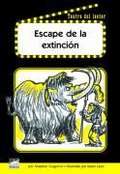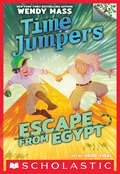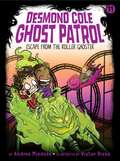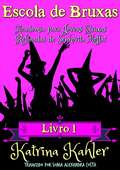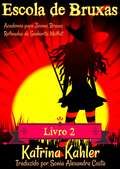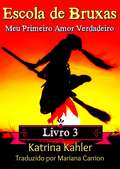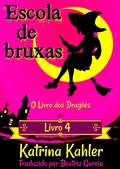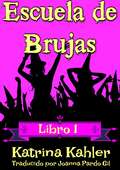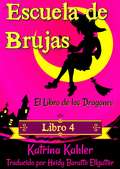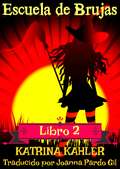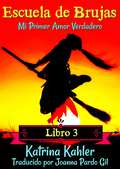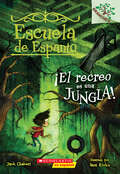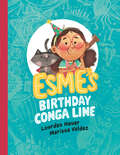- Table View
- List View
Es posible: ¿Qué es el color? (¡Arriba la Lectura!, Level R #51)
by Pamela Rushby Andrew Craig Wayne Bryant Nives PorcellatoNIMAC-sourced textbook
Es repugnante, ¡y lo comimos! Datos reales sobre comidas del mundo, hoy y a través de la historia (¡Arriba la Lectura!, Trade Book #8)
by James Solheim Eric BraceNIMAC-sourced textbook
Es tan solo Estanislao (¡Arriba la Lectura!, Read Aloud Module 2 #2)
by Jon AgeeNIMAC-sourced textbook
Escape from Egypt: A Branches Book (Time Jumpers #2)
by Wendy MassChase and Ava get stuck in the sands of time near King Tut’s tomb in this archaeological adventure from the–bestselling author of Stealing the Sword.Chase and Ava are ready for their next adventures as Time Jumpers! When Chase touches the dead, green-backed beetle in the suitcase, he and Ava spin through time—to King Tut’s tomb! Now they have to put the beetle back where it belongs. But the man with different color eyes is still chasing them . . . Why does he want these objects? Chase and Ava need to stay one step ahead of this bad guy. And they need to find some answers! Oriol Vidal’s engaging illustrations appear on every page. Newly independent readers will eat up this time-travel series from New York Times–bestselling author Wendy Mass.Pick a book. Grow a Reader!This series is part of Scholastic’s early chapter book line, Branches, aimed at newly independent readers. With easy-to-read text, high-interest content, fast-paced plots, and illustrations on every page, these books will boost reading confidence and stamina. Branches books help readers grow!Praise for the first book in the Time Jumpers series, Stealing the Sword“The characters are likeable and the story has lots of action.” —School Library Journal“Mass moves the plot along smartly to a climax featuring some brisk, if bloodless, swordplay.” —Kirkus Reviews
Escape from the Minotaur (Into Reading, Level V #37)
by Frank Pedersen Dennis MaNIMAC-sourced textbook
Escape from the Palace (The Royal Rabbits of London #2)
by Simon Sebag Montefiore Santa Montefiore Kate HindleyMission Impossible and James Bond have nothing on this wily bunch of rabbits who are pledged to protect the Queen of England—and the President of the United States—from a dastardly plot in this charming second novel of the Royal Rabbits of London series.Life is an adventure. Anything in the world is possible—by will and by luck, with a moist carrot, a wet nose and a slice of mad courage! Little Shylo Tawny-Tail is proud to call himself one of the Royal Rabbits of London, a secret order who live under Buckingham Palace and fight evil across the world. But high up in London’s famous skyscraper, the Shard, the horrible ratzis are plotting to cause chaos during a visit from the President of the United States. And when the Grand Burrow is attacked and Shylo is kidnapped, it looks as though they might just manage it! Can Shylo escape in time to save the day?
Escape from the Roller Ghoster: Now Museum, Now You Don't; Ghouls Just Want To Have Fun; Escape From The Roller Ghoster; Beware The Werewolf (Desmond Cole Ghost Patrol #11)
by Andres MiedosoDesmond and Andres visit a scary roller-ghoster in this eleventh haunted adventure in the Desmond Cole Ghost Patrol series!The Kersville Amusement Park is always a good time, but it also gives a new meaning to the term &“thrill rides.&” That&’s because, in addition to being a popular destination for heart-pounding fun, the park is also just a little bit haunted. Join Desmond and Andres as they try to enjoy their day at the amusement park while being chased by ghosts! Warning: You must be this tall to read this book. With easy-to-read language and illustrations on almost every page, the Desmond Cole Ghost Patrol chapter books are perfect for emerging readers.
Escape from the Zoo (Fountas & Pinnell Classroom, Guided Reading)
by Alice CaryNIMAC-sourced textbook <P><P>Rusty the red panda is missing from his exhibit at the National Zoo! The zoo workers immediately sound a special alarm. Where could Rusty be? Will the zookeepers be able to find him and bring him back safely to the zoo?
Escola de Bruxas Livro 1 Academia para Jovens Bruxas Refinadas de Senhorita Moffat
by Katrina Kahler Sonia Alexandra CostaLivros para raparigas dos 9 aos 12 anos: Imagina ter 11 anos e descobrir que és uma bruxa! Para Charlotte, essa foi uma grande surpresa! Ela não tinha ideia de que a mãe era uma bruxa e que estava prestes a ser matriculada na mais prestigiada Escola de Bruxas do mundo. No início, ela teve medo, mas quando conheceu novas amigas, professoras incríveis e viveu experiências mágicas ... ela começou a adorar a escola. Este belo e novo livro de Katrina Kahler irá levar-te a uma viagem mágica. Vais adorar as novas amigas de Charlotte, até mesmo Alice é divertida. Mas quando o caminho de Charlotte se cruza com o de Margaret Montgomery, coisas más acontecem ...vais adorar o suspense e o drama. Um livro perfeito para raparigas dos 9 aos 12 anos!
Escola de Bruxas Livro 2 Academia para Jovens Bruxas Refinadas de Senhorita Moffat
by Katrina Kahler Sonia Alexandra CostaUm excelente livro para meninas dos 9 aos 12 anos. Escola de bruxas Livro 2 continua a história de Charlotte e todos as suas amigos na Academia Miss Moffat para jovens bruxas refinadas. Margaret vinga-se de Charlotte antes de desaparecer da escola e coloca Charlotte numa situação perigosa e assustadora. As meninas treinam muito para a competição inter-escolar contra o a Escola de Feitiçaria e descobrem que as meninas da escola das bruxas más não compartilham dos seus valores e crenças no jogo justo. O Baile com os alunos da Escola do Feiticeiro é o evento no calendário escolar. As meninas conhecem algumas pessoas maravilhosas e têm uma noite interessante. As aulas continuam com a Senhorita Zara, que é professora de adivinhação. No entanto, algumas das meninas não ficam impressionadas com as suas visões. Se és uma rapariga de 9 a 12 anos e gostas de ler sobre a amizade e bruxas, então vais adorar esta história.
Escola de Bruxas Livro 3 Meu Primeiro Amor Verdadeiro
by Katrina Kahler Mariana CarrionCharlotte acorda de um terrível pesadelo, poderia ser verdade? Margaret voltou para assombrá-la? E então Charlotte encontra Charlie novamente, com seus corações palpitando enquanto se entreolham. Mas algo desagradável começa a acontecer, e Charlotte sentindo-se envergonhada e doente, tem que deixar Charlie nas mãos de Margaret. Charlotte descobre que tem um talento especial. A princípio difícil de controlar, mas com prática perceberá que é muito útil. A senhorita Moffat anuncia que as garotas passarão por três testes e o top cinco irá visitar o Colégio de magia. Como Charlotte se sairá? Ela precisa desesperadamente ver Charlie e explicar seu comportamento no encontro passado. Ela ou Margaret conseguirá? Descubra todos os detalhes nesta sequência emocionante.
Escola de Bruxas – Livro 4: O Livro dos Dragões (Escola de Bruxas - Livro 4 #4)
by Beatriz Garcia Katrina KahlerA paixonite de Charlotte por Charlie continua a crescer, enquanto ela compete contra ele pela Taça da Varinha Dourada, na Floresta Escura. A paixonite de Charlotte por Charlie continua a crescer, enquanto ela compete contra ele pela Taça da Varinha Dourada, na Floresta Escura. Claro que Margaret ainda é maldosa, deixando óbvias suas intenções com Charlie. De quem Charlie gostará mais, Charlotte ou Margaret? Duas das garotas, e um professora da Academia, criaram um plano terrível para ter acesso ao Livro dos Dragões. Mal sabiam que, ao abrir o livro, algo muito ruim aconteceria. Meninas, esta é uma sinopse curtinha, pois eu não queria estragar o livro para vocês. Espero que gostem.
Escuela de Brujas - Libro 1
by Katrina Kahler Joanna Pardo GilLibros para niñas de 9 a 12 años: ¡Imagina tener 11 años y descubrir que eres una bruja! Para Charlotte, ¡esto fue una enorme sorpresa! No tenía idea de que su madre era una bruja, y de que estaba a punto de ser enviada a la Escuela de Brujas más prestigiosa del mundo. Al principio tenía miedo, pero al hacerse de nuevas amigas, conocer a profesoras asombrosas y tener experiencias mágicas... terminó amando la escuela Este hermoso nuevo libro de Katarina Kahler te llevará a una aventura mágica. Amarás a las amigas nuevas de Charlotte, incluso Alice es entretenida. Pero cuando Charlotte se cruza con Margaret Montgomery, suceden cosas terribles... amarás el suspenso y el drama. ¡Un libro perfecto para niñas de 9 a 12 años.
Escuela de Brujas - Libro 4: El Libro de los Dragones - Para niñas de 9 a 12 años (Escuela de Brujas #4)
by Katrina Kahler Heidy Baratto EllgutterEl enamoramiento de Charlotte por Charlie, sigue creciendo cuando ella compite contra él en la Competencia de la Varita Mágica Dorada, en el Bosque Tenebroso. El enamoramiento de Charlotte por Charlie, sigue creciendo cuando ella compite contra él en la Competencia de la Varita Mágica Dorada, en el Bosque Tenebroso. Por supuesto, Margaret es una molestia y está haciendo patentes sus sentimientos hacia Charlie. ¿Quién le gustará más a Charlie? ¿Charlotte o Margaret? Dos de las niñas y una maestra de la Academia, han ideado un plan maléfico para poder tener acceso al Libro de los Dragones. Ellas no imaginan que abrir el libro provocará un evento catastrófico. Niñas, esta es una descripción corta, pero no quisiera arruinarles la historia del libro. Espero que les encante.
Escuela de Brujas Libro 2
by Katrina Kahler Joanna Pardo GilUn excelente libro para niñas de 9 a 12 años. Escuela de Brujas Libro 2 continúa ha historia de Charlotte y todas sus amigas de la Academia de la Profesora Moffat para Finas Brujas Jóvenes. Margaret se venga de Charlotte antes de desaparecer de la escuela y poner a Charlotte en una situación peligrosa y aterradora. Las niñas entrenan duro para su competencia entre escuelas contra el Colegio de Brujería, y en ese día descubren que las niñas de la escuela de brujas malas definitivamente no comparten sus valores y creencia en el juego limpio. El Baile Escolar con los estudiantes de la Escuela de Hechiceros es el día más destacado del calendario escolar. Las niñas conocen a unos asombrosos niños y tienen una muy interesante noche. Las lecciones escolares continúan con la profesora Zara, la maestra de adivinación. Sin embargo, algunas de las niñas no están contentas con sus lecturas. Si eres una niña de entre 9 y 12 años y te gusta leer acerca de brujas y amistad, ¡entonces amarás esta historia!
Escuela de Brujas Libro 3 Mi Primer Amor Verdadero
by Katrina Kahler Joanna Pardo GilLibros para niñas de 9 a 12 años: Charlotte se despierta de una horrible pesadilla, ¿podrá ser real? ¿Margaret regresó para vengarse? Charlotte vuelve a encontrarse con Charlie, y su corazón se detiene cuando se ven a los ojos. Hasta que algo desagradable ocurre, y Charlotte, completamente avergonzada y sintiendo nauseas, tiene que dejar a Charlie con Margaret. Charlotte descubre que tiene una habilidad especial. Al principio le es difícil controlarla, pero con la práctica, su habilidad resulta muy útil. La profesora Moffat anuncia que las niñas tendrán que pasar por 3 pruebas, y las mejores cinco visitarán el colegio de magos. ¿Cómo le irá a Charlotte? Tiene que ver a Charlie urgentemente para explicarle lo ocurrido en su último encuentro. ¿Podrá ir, o lo hará Margaret? Descubre todos los detalles en esta emocionante secuela.
Escuela de Espanto #3: Un libro de la serie Branches (Escuela de Espanto #3)
by Jack ChabertThis series is part of Scholastic's early chapter book line called Branches, which is aimed at newly independent readers.Sam, Antonio, and Lucy are passing around a soccer ball at recess when something strange happens... They soon find themselves in a fog-filled jungle! The grass and trees have come alive, growing high into the sky. And the friends discover that it's not just the school itself that's alive -- it's everything on the school grounds! Sam, Antonio, and Lucy must find their way out of a monstrous hedge maze in time to rescue the rest of the students! Now available in Spanish!Algo muy extraño sucede cuando Samuel, Antonio y Lucía juegan durante el recreo. ¡De pronto se encuentran en una jungla! La hierba y los árboles han cobrado vida y son enormes porque no sólo la escuela está viva sino también todo lo que la rodea. ¡Samuel, Antonio y Lucía deberán salir del laberinto en el que se encuentran y salvar al resto de los estudiantes!
Escuelas alrededor del mundo (¡Arriba la Lectura!, Read Aloud Module 1 #4)
by Clare LewisNIMAC-sourced textbook
Esculturas de la naturaleza (¡Arriba la Lectura!, Level M #25)
by Margaret FettyQuizá no lo sabías, pero el viento, el agua y el hielo transforman el suelo. Estas fuerzas actúan por millones de años y crean esculturas en la naturaleza. Descubre cómo lo hicieron y qué formas asombrosas crearon. NIMAC-sourced textbook
Esme's Birthday Conga Line (Esme!)
by Lourdes HeuerEsme always has a plan. A funny and sweet early illustrated chapter book about a problem-solving girl who has to manage her own birthday bash. For fans of Dory Fantasmagory.Esme lives with her grandparents on the uppermost floor of the topmost best building. It's her birthday. Mimi and Pipo gave her a beautiful guitar. But they didn't plan a birthday party.Esme thinks this is the way with grandparents. They don't know about parties or piñatas or birthday cake. No problem! Esme is great at problem solving.With the help of her cat, El Toro, and a LOT of help from her neighbors in the topmost best building, the irrepressible Esme gets the birthday party of her dreams.
Espaces: Rendez-vous avec le monde francophone
by Cherie Mitschke Cheryl TanoNIMAC-sourced textbook
Espaces: Rendez-vous avec le monde francophone
by Cheryl Tano James G. MitchellNIMAC-sourced textbook
Espanol Santillana, High School 1
by Lori Langer de Ramirez Miguel Santana Eduardo FernNIMAC-sourced textbook
Espanól Santillana, Middle School 1A [Student Book]
by Anne Smieszny Ana Isabel Antón Andrea RobersonNIMAC-sourced textbook

